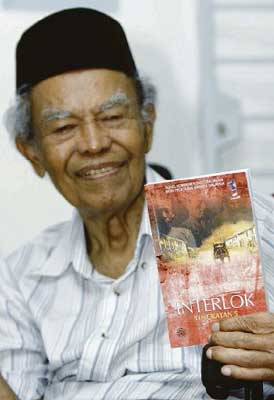The sport called politics
Professor Tan Sri Dato' Dzulkifli Abd Razak
Learning Curve : Perspective
New Sunday Times - 03-04-2011
UNIVERSITI Sains Malaysia (USM) had the privilege of hosting delegates from the Asian University Sports Federation and Asean University Sports Council on its campus last weekend.
Both organisations were in consultation with their Malaysian counterparts to promote greater collaboration in sport in the region. Sport has always been a fertile area to forge understanding and build rapport between various communities regionally and globally. Sportsmen and sportswomen are keen to pursue such lofty goals.
In the discussion, a delegate from South Korea was fascinated to see Malaysians living together harmoniously, given the diversity across many dimensions compared with other countries. It was an eye-opener for him. While I elaborated on the rich experiences of Malaysians while growing up, a delegate from China drew a contrast with what is happening in Korea.
The Korean peninsula, which is divided ideologically into north and south, is almost at the other end of the spectrum. Though people on both sides of the divide are similar in almost every way, the two governments are somehow at odds with each other. At times, violence occurs, and lives have been lost despite the many who still have blood ties across the border!
The economic disparity is enormous, again related to the ideological gaps that exist between the two countries. Efforts to bring unity to both sides have been illusive due to the political wrangling that holds them back.
There is no denying that political and ideological fanaticism can cause divisiveness, not only among societies globally but also among family units. Malaysia has seen too many of this example in recent years and more so when there is an election around the corner. While ethnic-based political parties are often blamed for this, the same can be said for the so-called non-ethnic ones, which seem to conveniently subscribe to the "if you can't beat them, join them" strategy. Therefore, it is not unusual to read statements and see people pandering to ethnic sentiments just to unashamedly secure more votes in the hopes of winning the election.
Once the elections are over, the rhetoric immediately shifts once again to that of "unity" until the next election. It is this flip-flopping that puts the agenda of a unified Malaysia -- bangsa Malaysia -- on a tentative mode.
And it is seemingly no more than sloganeering! Most are not persuaded of its seriousness. It is unfortunate when good intentions are sacrificed at the altar of self-interest in politics. For example, National Laureate Datuk Abdullah Hussain, author of Interlok, recently expressed his disappointment that "people misunderstood his work and accused him of being racist". The accusation apparently came from a raced-based!

Abdullah reiterated that "some quarters did not understand the true essence of the novel (Interlok)". This often happens when you are too engrossed with your myopic mindset that you miss the big picture. Issues that can be settled with sound intellectual discourse are usurped by narrow political expediencies.
But fortunately the 91-year-old Abdullah is magnanimous enough to accept a compromise despite his expression of regret.
Indeed, it is this magnanimity that makes visitors to Malaysia sense that the country is different. The contrast cannot be more apparent when compared to nations in which the very notion of "multiculturalism" is rejected point blank. Their ultimatum can be uncompromising -- "take it or leave it!".
Their firmly held values mean that others, especially the minority and migrant population, must assimilate their ways. Strangely enough, such a stance received widespread endorsement in many countries in Europe (Human Rights Are Not For Sale, Learning Curve, March 6).
While Malaysia is highly unlikely to take the European approach, it is important that we are more appreciative of values which have benefited many since pre-Independence.
Perhaps we need to give deeper thought to what Abdullah said: "If you read (the book) until the end, you will see the actual meaning!" Our tragedy is that we are in such a rush to reach for short-term gains that many a time we do not arrive at the "actual meaning" in the long run. Using sport as an analogy, it is about winning rather than sharing, even though it may well end up in a fight!
Abdullah, we cannot thank you enough!
* The writer is the Vice-Chancellor of Universiti Sains Malaysia. He can be contacted at vc@usm.my
